Guyana Focus

Guyana’s economy is characterized by volatile production patterns in all of its key productive sectors. Notwithstanding, GDP growth, though declining, has been relatively healthy over the 10-year period, 2007-2016, averaging 4.2% annually (See Chart 1). Although the Mining and Quarrying sector, fuelled primarily by increasing gold production, is the only sector to experience strong growth over the past three years, the Agriculture, Fishing and Forestry sector remains the overall largest contributor to GDP growth, averaging 18.3% over the 2006-2016 (See Chart 2).
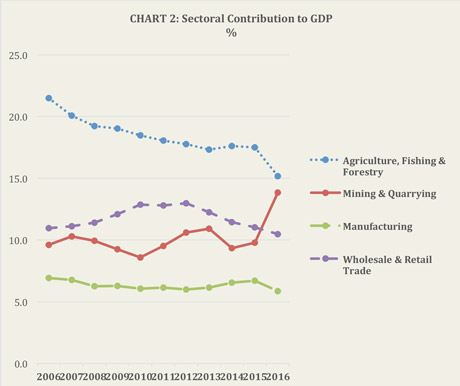
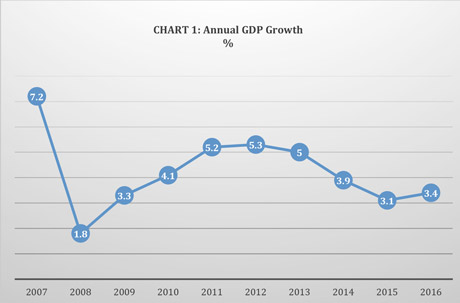
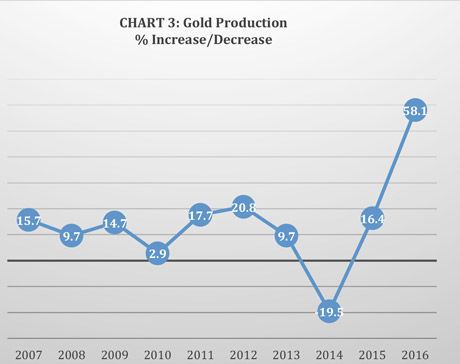
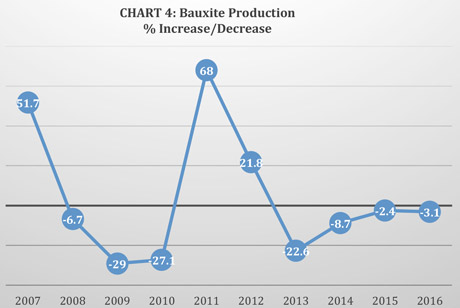
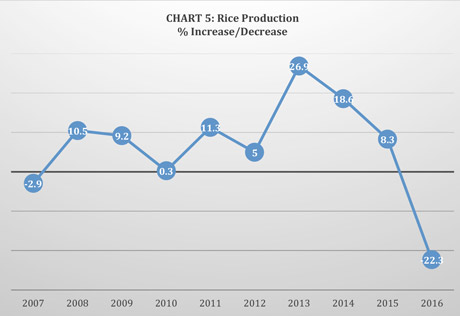
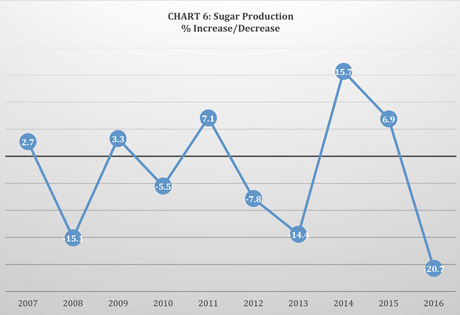
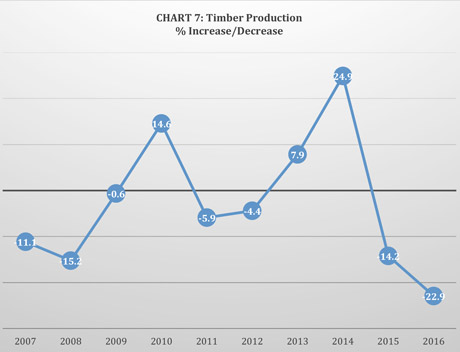
However, the contribution of Agriculture, Fishing and Forestry has been declining steadily, falling from 21.5% in 2006 to 15.2% in 2016. Comparatively, Mining and Quarrying’s contribution has increased from 9.6% to 13.8% in the same period, indicating the growing contribution of gold. After falling by 19.5% in 2014, gold production picked up significantly in the following two years, growing by a record 58.1% in 2016. (See Chart 3).
Bauxite, the other main component of the Mining and Quarrying sector, on the other hand, has experienced dramatic swings in production. Though the sector experienced very strong growth in 2007 and 2011, growing by 51.7% and 68%, respectively, its average growth rate for the 2007-2016 period was only 4.2% (See Chart 4).
The rice sector experienced strong growth between 2008 and 2015, reaching record production levels in 2013. However, production slumped by 22.3% in 2016, lowering rice’s average 10-year growth rate to 6.5%.
Sugar and timber have been the two weakest sectors over the 10-year period, 2007-2016. They have experienced the highest degree of volatility and have both experienced negative growth rates over the period. Sugar production fell by an average of 2.8%, while timber production fell by 2.7% (see Charts 6 and 7).
Evidently, volatile to declining production patterns have had a slowing effect on Guyana’s economy. A reversal of this trend is necessary if Guyana is to reduce its dependency on oil which is expected to come on stream in 2020.
escaping natural resource curse –
Ramkarran, Khemraj
Georgetown – Citing the political and ethnic divide in the country, economist Tarron Khemraj and political analyst Ralph Ramkarran say that co-operation between the two major parties is required if Guyana is to escape the natural resource curse that could threaten benefits from the impending oil economy.
In his Business Page column in this week's Sunday Stabroek, Khemraj argued that the projects necessary for escaping the curse will require political cooperation.
He said some kind of arrangement will be required to allow both the elites of the PNCR and PPP/C to claim joint ownership of the big ticket infrastructure projects and any future new industry outside the oil and gas sector. He posited that having first-world infrastructure will not necessarily change the structure of exports and production, but is a necessary start. In spite of the developed physical infrastructure of an established oil economy like Trinidad and Tobago, Khemraj said that that country still depends on oil and gas for most of its export earnings.
The resource curse generally refers to the paradox that countries with abundant natural resources like fossil fuels tend to have lower economic growth, less democracy, and poorer development outcomes than countries with fewer natural resources.
Khemraj warned that any political consensus outside of a binding constitutional arrangement will not work, especially the opportunistic type of agreement like the Cummingsburg Accord which formed the basis for the coalition between APNU and the AFC which won the 2015 general elections. He argued that the likelihood of reneging is very high if cooperation is not enshrined in a new constitution. Further, reneging is almost certain given the nature of the core support of the PPP/C and PNCR. He said that the present constitution allows for consensus through committees but this is not sufficient as it does not allow for joint elite ownership of the big development projects.
Writing under the heading `Political cooperation is necessary for escaping the natural resource curse’, Khemraj said “Most of Guyana’s political troubles originate from the fact that the main parties derive a significant percentage of their support from one of the two dominant ethnic groups. In the past, I have labelled this strategic pro-ethnic voting. Most Guyanese, but not all, vote to keep the other side out of power. This does not mean they are bad people. It implies that these folks are faced with limited trust and information about how the other side will vote in secret ballot. Therefore, the safe strategy is for many to vote for their respective leaders who they perceive will look after their economic interests. The group that wins has a sense of victory and demands economic rewards. The group that loses has traditionally expressed a feeling of marginalization and discrimination, real or perceived”.
The principle is the same, he said, for inter-group political rivalry.
“The winners discount the future at a lower rate compared with the losers. This is because the winners perceive better returns since their kith and kin are the leaders. The losers take the opposite position as they perceive their interests are under threat. This difference in subjective discount rate has serious implications for long-term economic growth. Commonsense tells us that if we can get everyone to have a level of optimism somewhere between the high and low discount rates, the economy will grow faster in the long-term. Hence, political consensus and cooperation are necessary to get everyone marching at the same rate, thus boosting economic growth in a sustainable manner. Oil revenues will no doubt boost growth, but not necessarily in a sustainable manner”, he contended.
He cautioned that elite cooperation enshrined in a new constitution is not without its risks as any political cooperation between the PNCR and PPP/C will result in an authoritarian government, as these are instinctively authoritarian parties. The recent firing of columnists Dr David Hinds and Lincoln Lewis from the state-owned Guyana Chronicle, he said, underscores the authoritarian instincts of the PNCR and the derivative politicians in AFC.
Khemraj said that the new sizable multi-ethnic group of voters in Guyana presents an opportunity for providing credible electoral challenges to the incumbents should constitutional overhaul present an authoritarian power sharing system.
“The independent voters of Guyana will have to play this crucial role as challenger even if there is no constitutional overhaul to promote cooperation. Otherwise, I am extremely pessimistic that Guyana can escape the resource curse since the political will does not appear to exist in the PPP/C and PNCR for shaping a new law of the land”, Khemraj said.
In his column entitled 'The root of the evil', Ramkarran argued similarly that because of the existence of two large race groups which are in political competition, stemming from economic competition for scarce resources, electoral success by one group is seen not merely as a reversible electoral loss.
“It is seen as devastating to the political and economic security of the other group. With one group in power, it is accepted as fact that discrimination and marginalization will take place against the other group. One group is alleged to have economic power which, coupled with political power, harms the progress of the other group by discrimination. The other group is alleged to have administrative/ bureaucratic/security power, and that with political power it discriminates and suppresses the other group. These narratives, whether true or not, have been with us since 1957 – for 60 years. They are not going to go away”, Ramkarran, a former two-term Speaker of the National Assembly, argued.
He said that the struggle for political office has an additional dimension here.
“Since the politics is based in ethnic competition, the struggle for political office becomes a struggle for ethnic dominance. An electoral victory is not seen as a victory for the political left or the political right, or for social democracy or liberal democracy, or for left wing or right wing economic and political policies. It is seen in purely ethnic terms – which ethnic group gains dominance. That is the root of the evil in Guyana’s politics”, Ramkarran, a former longstanding member of the PPP, argued.
He stated that Guyana cannot achieve the economic progress and the growth of the economy at a sufficiently rapid rate to deal with the problems of the society unless this ethnic competition is channelled into constructive streams and the fears are substantially reduced.
“In looking to the future, the impact of the oil economy needs to be considered. The income flow of 500,000 barrels of oil a day, or perhaps more, will transform the economic possibilities for Guyana. But unless a political solution is found to the ethnic issue, no matter which party is in office, the Dutch disease will rapidly overtake Guyana, corruption will explode, bad governance will continue, the rich will become richer, and the poor will have to satisfy themselves with being the left behind stragglers catching the crumbs as labourers, semi-skilled workers and service providers at the lower end, eking out a livelihood. Oil wealth will pass them by”, Ramkarran declared.
He said it is a great tragedy that the APNU+AFC government has abandoned its manifesto promise of constitutional reform which, with modifications, would have harnessed the ethnic competition into constructive efforts and would have eliminated the suspicions over elections. “APNU+AFC had the chance of transforming Guyana’s economy, politics and society, charging into history as the true builder for which Dr Ptolemy Reid praised Founder Leader Forbes Burnham. But instead, APNU+AFC has now chosen to let history pass it by, seeking APNU+AFC, not national solutions, with a one seat majority, in a country divided by a partisan gorge. This government, refusing to honour its own manifesto pledge to the Guyanese people, will end up as no more than a footnote in Guyanese history”, Ramkarran stated.
British envoy
Addressing the opening of a two-week workshop on fraud, bribery and corruption, Britain’s High Commissioner to Guyana, Greg Quinn said he was unapologetic in his stance.
“There is no place for corruption within the security agencies in Guyana. If officials or individuals cannot work with honesty and integrity, then they should be drummed out, prosecuted and imprisoned as necessary. If people don’t like the sound of that, then frankly: TOUGH!,” he said.
Quinn said security agencies could not expect respect and cooperation from the public if they themselves are not willing to operate within and be subject to the law.
“All of you here today can and must set the example for everybody else to follow,” he said in his address to participants of the two-week workshop that has been funded and organised by the British government as part of its support to Guyana’s Security Sector Reform Programme.
The participants have been drawn from the State Asset Recovery Agency, Special Organised Crime Unit of the Guyana Police Force, the Criminal Investigations Department of the Guyana Police Force and the Customs Anti-Narcotics Unit of the Ministry of Public Security.
The course would focus on investigating serious and complex fraud, bribery and corruption cases, and an examination of major fraud and bribery case scenarios designed for the participants to put into practice what they are learning.
“All of the participants of this course are in the frontline of countering bribery, fraud and corruption but with that comes with responsibility ” he said.
Meanwhile, the British envoy announced that Retired British army officer, Russel Combe would be returning shortly to serve as security advisor to President David Granger for one year.
hotel worker
Jagdeo, of Lot 3 Ogle, East Coast Demerara, was found guilty of discharging a loaded firearm at Brandon Collins on March 30th, 2017.
After being charged in April last year, Jagdeo was released on $100,000 bail pending the outcome of her trial before Magistrate Alisha George at the Sparendaam Magistrate’s Court.
Collins, a maintenance worker of the Alpha Hotel at Ogle, was clearing vines from the hotel’s fence when he was asked to leave, by Jagdeo, the owner of the house next door.
After he ignored her, the then, 69-year-old woman, who was a licensed holder, armed herself and discharged a round at Collins, which struck him in the abdomen.
A hotel staffer had claimed that Collins had turned his back to remove himself from the fence when the woman shot him.
“He had been trimming the trees that was over the fence. He had finished the front and was working at the back and the woman was standing on her verandah. She turned and tell him to come off the fence before she shoot him,” the employee, who asked not to be named, had related to this newspaper.
Collins, of Manchester, Corentyne, Berbice, was admitted at the Georgetown Public Hospital for some time after the shooting.
To advertise in ICW call
Call 905-738-5005